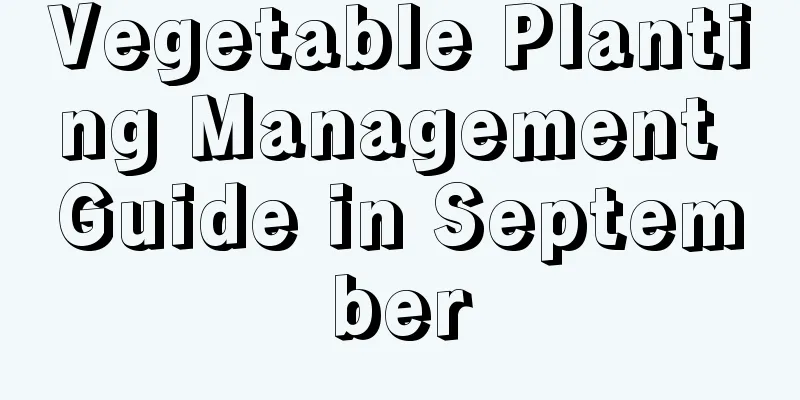Vegetable Planting Management Guide in September

|
September is a critical management period for vegetable growers. At this time, summer crops gradually mature and are ready for harvest, and the sowing and management of autumn vegetables also enter an important stage. So what should we pay attention to in specific planting management work? Let’s take a look at the vegetable planting management guide for September. 1. Seeding and planting Vegetables suitable for sowing in September include spinach, lettuce, chrysanthemum, lettuce , Chinese cabbage , coriander, and chrysanthemum. These leafy vegetables prefer a cool climate and have a short growth cycle, so they are suitable for sowing after the White Dew solar term. 2. Soil management It is necessary to do a good job of cleaning the ditch system, keep the soil moist, and cover and shade the unemerged seedlings to help retain moisture and facilitate emergence. In addition, for bases with equipment, we should make good use of water-fertilizer integration technology and use water-soluble fertilizers reasonably. 3. Field management First, for vegetables that are already in the garden, sufficient base fertilizer should be applied, and more phosphorus and potassium fertilizers should be applied. Attention should be paid to tilling and loosening the soil to enhance soil permeability. The second is to combine watering with the application of light fertilizer, improve the quality of thinning, pay attention to seedling selection, and water reasonably to prevent excessive humidity from causing root rot and seedling death. The third is to carry out "flooding the garden" after the rain to lower the soil temperature and alleviate rainy season diseases. 4. Harvest and Cleaning September is the ripening period for many summer vegetables, such as tomatoes, cucumbers, peppers, etc. They should be harvested in time to avoid over-maturity or the spread of diseases. After harvest, clean up the stumps and diseased leaves in the field to reduce the overwintering base of pests and diseases. 5. Keep warm and protect against cold After September, the temperature difference between day and night increases. For vegetables with weak cold resistance, if the temperature drops at night, you can use mulch to protect them from frost damage. 6. Pest and disease control The focus is on preventing and controlling root rot, viral diseases, downy mildew, and various pests such as the American leafminer, aphids, whiteflies, etc. Specific prevention and control can be carried out according to the occurrence patterns and harm characteristics of each disease and pest. Give priority to biological and physical control methods and reduce the use of chemical pesticides. To sum up, the vegetable planting and management work in September needs to comprehensively consider multiple aspects such as sowing and planting, field management, pest and disease control, harvesting, and insulation to ensure the healthy growth and harvest of vegetables. However, in actual operation, adjustments must be made based on local conditions.
|
<<: Fruit tree planting management guide in September
>>: When is the best time to plant carrots?
Recommend
Time and method of cuttings of Fraxinus chinensis
Cutting time of Fraxinus chinensis Fraxinus chine...
Cultivation methods and precautions of Monstera
1. Using soil and changing pots Monstera can take...
How to tell when it's time to water the white palm
Be careful when watering white anthurium. When th...
How many years does it take for wolfberry trees to bear fruit?
Introduction to Planting Wolfberry Trees When the...
What flowers are suitable for growing in Baishan? What are the city flowers and trees?
1. Climate characteristics of Baishan Baishan has...
Tips for growing azaleas
1. Pruning This kind of plant will drop its flowe...
What is the best pollination tree for Meizao cherries (what pollination tree is suitable for cherries)
Big cherries must be paired with pollinated trees...
What vegetables are suitable for planting in June? What vegetables are suitable for planting in June?
The temperature in June is obviously hot, and eve...
Can red safflower be hydroponically cultivated? How to hydroponically cultivate red safflower
Can red sedge be hydroponically cultivated? Red s...
Beauty refers to the years when grapes bear fruit
Introduction to Planting Beauty Finger Grapes Bea...
How to prune a potted orange tree?
Potted orange tree pruning time Potted orange tre...
How to propagate apples and what to pay attention to
Apple reproduction method The most common method ...
How often should I water the tiger thorn plum?
1. Spring and Autumn The climatic conditions in d...
How to germinate peach seeds? Simple method to quickly germinate peach pits
How to Germinate Peach Seeds 1. Soak in warm wate...
Can the green radish be repotted in summer? When can it be repotted?
Can the green radish be repotted in summer? The g...









